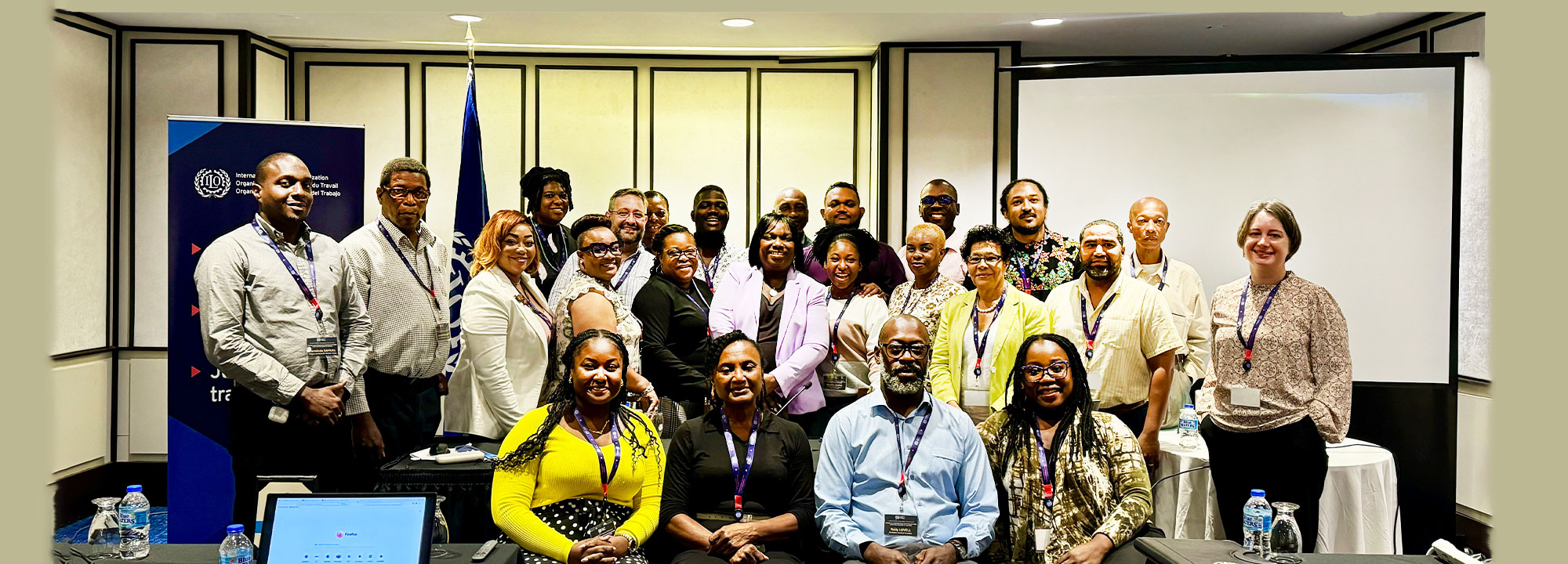Twenty Caribbean trade union representatives better prepared to utilize ILS following ILO training
A recent training programme hosted by the International Labour Organization (ILO) Caribbean Office in collaboration with the ILO Bureau for Workers’ Activities (ACTRAV) provided trade union leaders with valuable insights and practical skills to enhance their role in the application of international labour standards (ILS).Â
Held over three weeks (22 July – 9 August), the programme included a combination of online and in-person sessions, aimed to deepen participants’ understanding of the ILO’s supervisory mechanisms and improve their strategic use in advocating for workers’ rights.
Participating countries included: Antigua and Barbuda, Bahamas, Barbados, Belize, Dominica, Grenada, Guyana, Jamaica, Saint Kitts and Nevis, Saint Lucia, Saint Vincent and the Grenadines, Suriname, Trinidad and Tobago.Â
“Trade unions play an essential role in the administration of ILS, and they have the right to report on the application of these standards. However, in this subregion, trade unions have historically been less active in submitting reports to the Committee of Experts on the Application of Conventions and Recommendations (CEACR). We have introduced this tailored programme to encourage greater Caribbean trade union contributions in the reporting process. Participants will benefit from practical exercises to prepare submissions to the CEACR, develop action plans, and deepen their understanding of ILS and their practical application,” explained Vera Guseva, Workers’ Activities Specialist at ILO Caribbean, who co-organized the training with ILO ACTRAV.Â
Throughout the training, participants gained a comprehensive understanding of ILS as critical tools for promoting decent work conditions in the Caribbean. The first week introduced participants to the fundamentals of ILS through self-guided online activities, including reading materials and videos to ensure they had a solid foundation before engaging in more complex discussions.
In the second week, participants attended webinars led by ILO experts, which provided them with detailed knowledge about the ILO’s supervisory mechanisms as well as broader international labour agenda. Sessions focused on how trade unions can effectively use these mechanisms to hold governments accountable for implementing ratified Conventions. They also learned how to analyze the application of ILS in their own countries and identify areas where improvements are needed. A special session was organised to keep the Caribbean unionists up to date with the ILO International Labour Conference conclusions of its 2024 session.Â
The final week of the training was a face-to-face workshop in Port of Spain, Trinidad and Tobago, where participants applied their knowledge in practical exercises. Activities included drafting reports to be submitted to the Committee of Experts on the Application of Conventions and Recommendations (CEACR). Additionally, they learned how to develop strategic work plans on ILS tailored to the regional context. This included understanding the importance of regional collaboration in promoting labour law reforms and occupational safety and health as fundamental principles and rights at work (FPRW).
Featured presenters included Vera Guseva, Workers’ Activities Specialist at ILO Caribbean; Victor Hugo Ricco, Senior Specialist at ILO ACTRAV; Aikaterini Charara, Legal Officer at the ILO International Labour Standards Department (NORMES); Resel Melville, National Project Coordinator, Regional Initiative Latin America and the Caribbean Free of Child Labour and ILO Caribbean; and Monica Tepfer, Legal Officer at the International Trade Union Confederation.Â
“ILO ACTRAV is pleased to offer and deliver a programme that targets areas where Caribbean trade unions can benefit from additional support to enhance their knowledge and use of the ILO ILS System including its supervision. Boosting their capacity will lead trade unions to be best placed to better protect social and economic rights of all workers in the region,” said Victor Hugo Ricco.Â
As a result of the training, the 20 trade union participants are now better equipped to contribute to the effective implementation of ILS in their countries. They have a clearer vision of how to use ILO mechanisms to protect and promote workers’ rights, and ensure that their voices are heard at national, regional and international levels.

